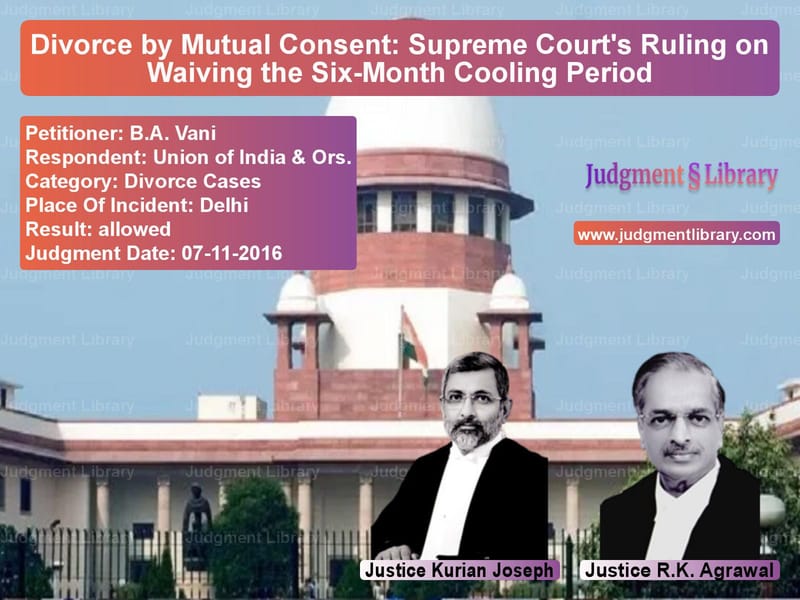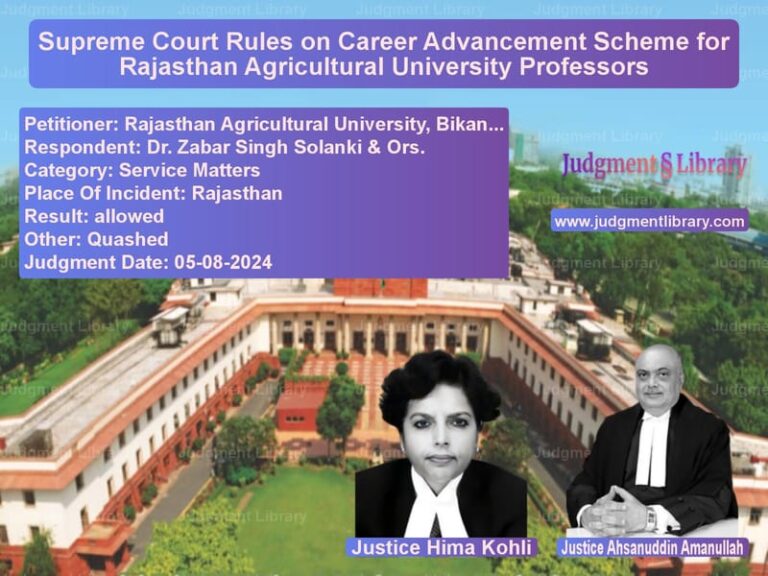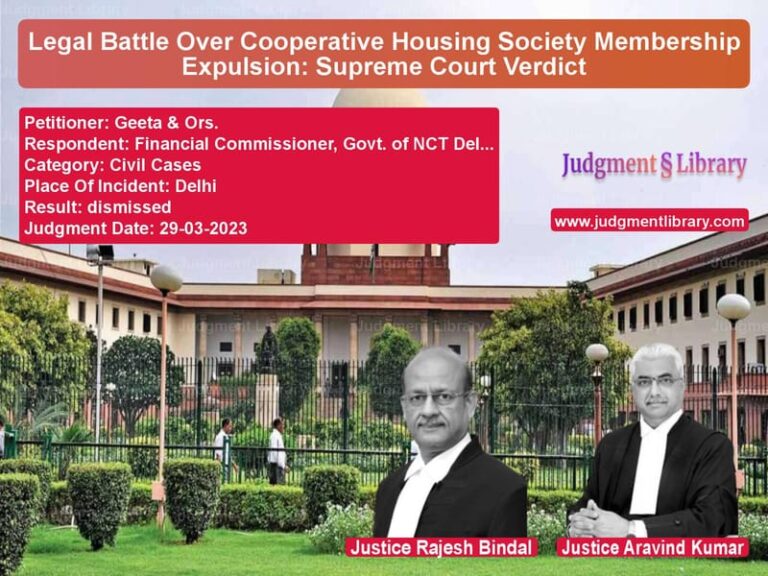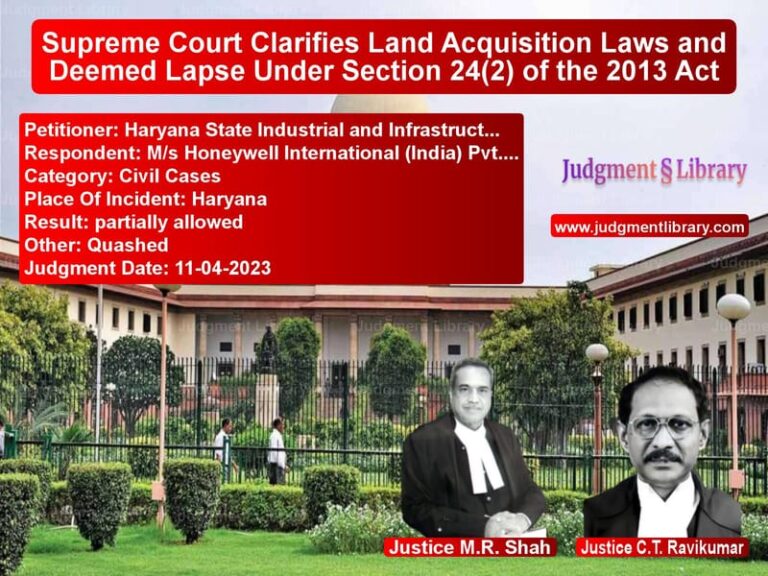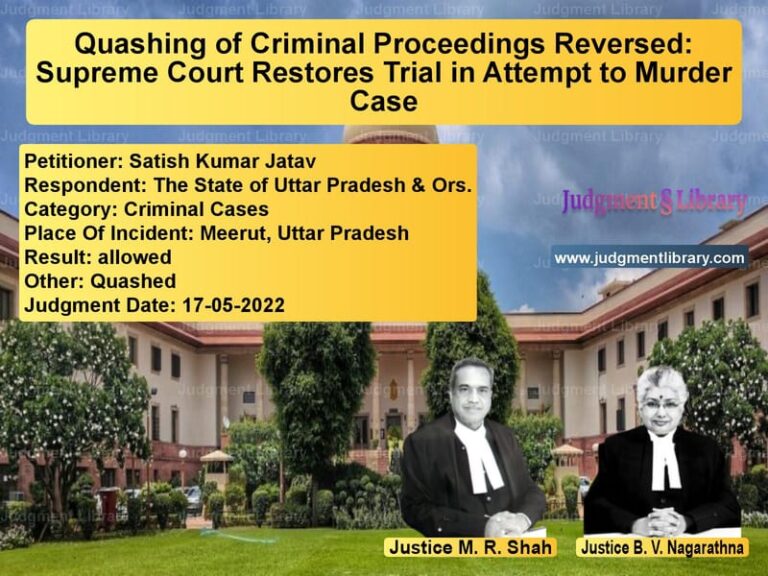Divorce by Mutual Consent: Supreme Court’s Ruling on Waiving the Six-Month Cooling Period
The Supreme Court of India, in the case of B.A. Vani vs. Union of India and Another, addressed the issue of waiving the mandatory six-month cooling-off period under Section 13B of the Hindu Marriage Act for granting a divorce by mutual consent. This case highlights the Court’s approach in cases of prolonged separation, and the interest of justice in providing quick relief to couples who have been in a long-term separation.
The petitioner, B.A. Vani, and her husband, the second respondent, had been living separately for seven years. Despite this long separation, the couple had not yet filed for divorce by mutual consent, which led to a lengthy legal battle. With the intervention of the learned Amicus Curiae, the parties agreed to file a petition under Section 13B of the Hindu Marriage Act, seeking a divorce by mutual consent. This case raised the issue of whether the Supreme Court could waive the mandatory six-month period under Section 13B of the Hindu Marriage Act in the interest of justice.
Background of the Case
The petitioner and the second respondent had been living separately for seven years. Despite this, they had not filed for divorce by mutual consent. However, after the intervention of the learned Amicus Curiae, the couple decided to file a petition under Section 13B of the Hindu Marriage Act, seeking to dissolve their marriage by mutual consent. The legal question at hand was whether the mandatory six-month waiting period required under Section 13B could be waived in this case, given the long separation between the parties.
The parties were both present before the Court, and it was noted that they were both Advocates. The learned Amicus Curiae argued that, in view of the long separation and several rounds of litigation, it was an appropriate case for the Court to invoke its powers under Article 142 of the Constitution of India to waive the cooling-off period and grant a divorce by mutual consent.
Key Legal Issues
The Supreme Court considered the following issues:
- Whether the six-month waiting period under Section 13B of the Hindu Marriage Act could be waived in cases of long-term separation and mutual consent.
- Whether the intervention of the learned Amicus Curiae was justifiable in seeking a waiver of the statutory waiting period.
- Whether the dissolution of the marriage through mutual consent was in the best interest of justice given the circumstances of the case.
Petitioner’s Arguments
The petitioner, B.A. Vani, contended:
- Both parties had been living separately for over seven years.
- They had already agreed to a divorce by mutual consent and sought to dissolve the marriage under Section 13B of the Hindu Marriage Act.
- The mandatory six-month waiting period should be waived, as it served no useful purpose in this case, given the prolonged separation.
- The intervention of the learned Amicus Curiae played a crucial role in facilitating the decision to file for mutual consent divorce.
Respondent’s Arguments
The respondent, Union of India, supported the petitioner’s request, agreeing that the six-month waiting period could be waived given the unique circumstances of the case. The respondent emphasized:
- The parties were in agreement for a mutual divorce and had been separated for a considerable period.
- The intervention of the learned Amicus Curiae was invaluable in bringing the parties together to seek a legal resolution.
- The waiver of the waiting period was in the interest of justice, as it would prevent unnecessary delay in the legal process.
Supreme Court’s Observations
The Supreme Court, while deliberating on the matter, made the following key observations:
1. The Purpose of the Six-Month Waiting Period
The Court acknowledged that the six-month cooling-off period in Section 13B of the Hindu Marriage Act was intended to give the couple time to reconsider their decision. However, in cases where the parties have been separated for a long time and have already made the decision to divorce, the waiting period becomes redundant.
2. Use of Powers Under Article 142 of the Constitution
The Court noted that it could exercise its powers under Article 142 to grant relief in the interest of justice. Given the long separation and the mutual consent of the parties, the Court held that it was appropriate to waive the six-month waiting period in this case.
3. The Role of the Learned Amicus Curiae
The Court commended the intervention of the learned Amicus Curiae, noting that their involvement had played a key role in facilitating the parties’ agreement to seek divorce by mutual consent. The Court appreciated the efforts made to bring about a resolution to what had been a prolonged and contentious issue.
Final Judgment
The Supreme Court ruled in favor of the petitioner and granted the divorce by mutual consent. The Court issued the following orders:
- The marriage between the petitioner and the second respondent was dissolved by a decree of divorce under Section 13B of the Hindu Marriage Act.
- The six-month waiting period prescribed under Section 13B was waived in this case, given the long separation and the mutual consent of the parties.
- The Writ Petition was dismissed as per the Court’s order.
Judgment Outcome: Divorce granted by mutual consent, six-month waiting period waived.
Don’t miss out on the full details! Download the complete judgment in PDF format below and gain valuable insights instantly!
Download Judgment: B.A. Vani vs Union of India & Ors Supreme Court of India Judgment Dated 07-11-2016.pdf
Direct Downlaod Judgment: Direct downlaod this Judgment
See all petitions in Alimony and Maintenance
See all petitions in Mutual Consent Divorce
See all petitions in Property Division in Divorce Cases
See all petitions in Judgment by Kurian Joseph
See all petitions in Judgment by R K Agrawal
See all petitions in allowed
See all petitions in supreme court of India judgments November 2016
See all petitions in 2016 judgments
See all posts in Divorce Cases Category
See all allowed petitions in Divorce Cases Category
See all Dismissed petitions in Divorce Cases Category
See all partially allowed petitions in Divorce Cases Category

